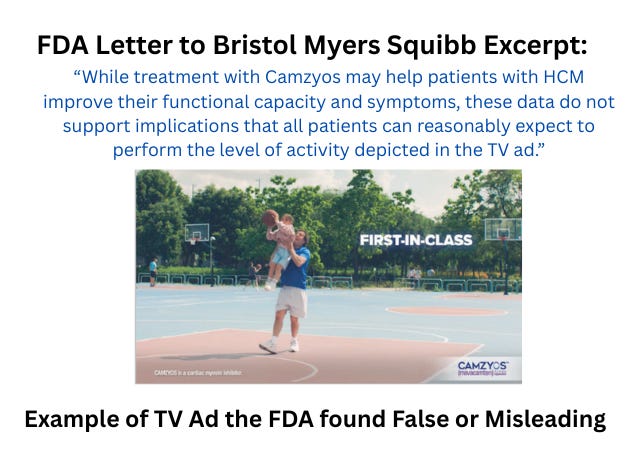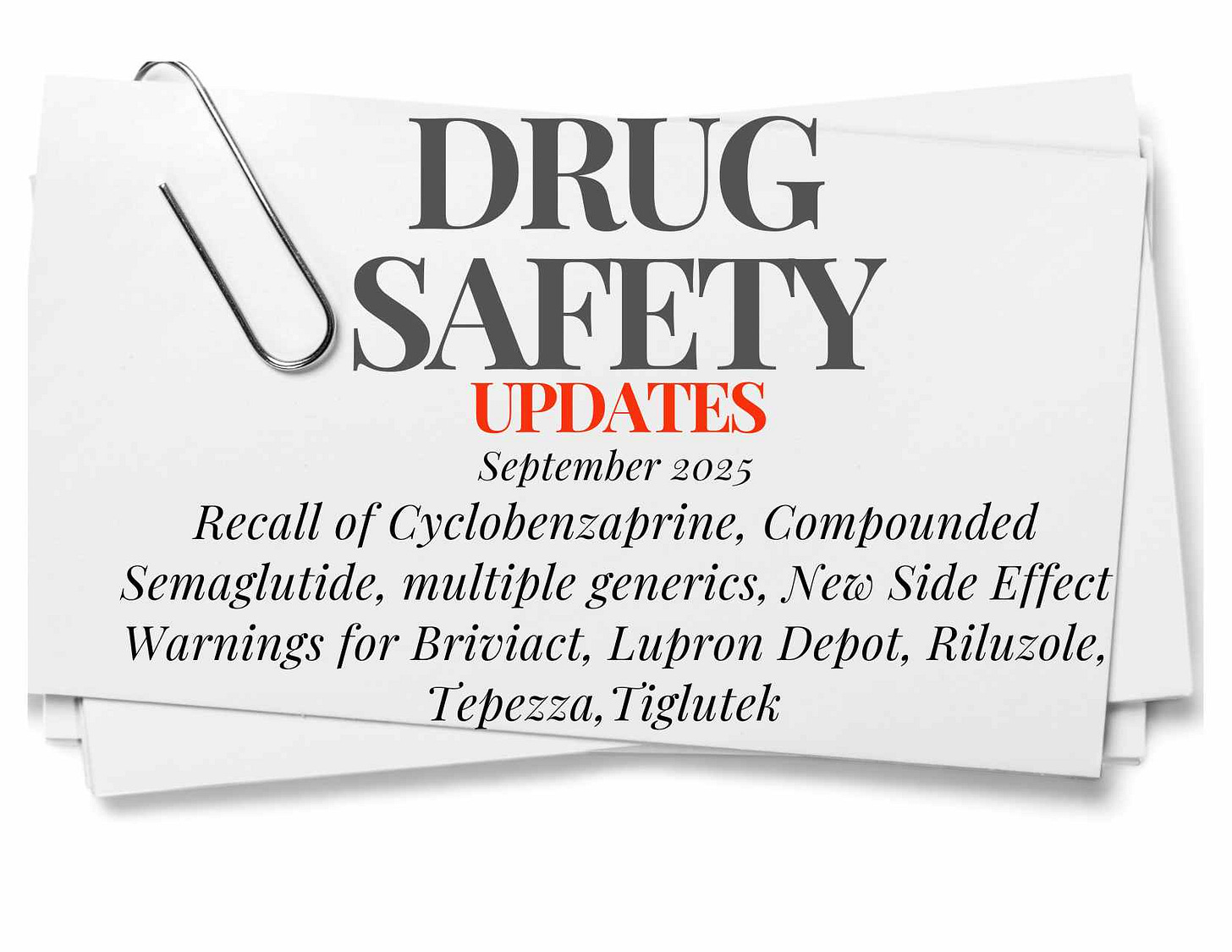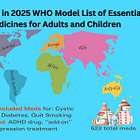Nationwide Recalls for Cyclobenzaprine, Multiple Generics; Warnings for Briviact, Lupron Depot, Riluzole, Tepezza, Tiglutek; Pharma Ad Crackdown, More
Drug Recall: Cyclobenzaprine Hydrochloride
Unichem is recalling one lot of 10 mg cyclobenzaprine hydrochloride tablets due to a labeling mix-up. 230 bottles of Meloxicam USP, 7.5mg, 90-count tablets (yellow in color), were inadvertently labeled as cyclobenzaprine hydrochloride tablets USP, 10 mg 90-count tablets (blue in color). This is a Class I recall, the most urgent kind of recall because of the potential danger to consumers.
The pills were manufactured by Unichem Laboratories in Bardez, Goa, India for Unichem Pharmaceuticals (USA), Inc. East Brunswick, NJ. The lot number is GMML24026A with a product expiration of 09/30/2027. Cyclobenzaprine is a muscle relaxant and is also known by the brand name drugs Amrix and Flexeril. Meloxicam is a non-steroidal anti-inflammatory drug used to treat arthritis pain.
FDA Press Release and FDA Enforcement Report
Compounded Semaglutide and Tirzepatide Recalls
In August 2025, we reported on a recall of compounded semaglutide and tirzepatide (the active ingredients in Ozempic and Mounjaro). Now, three compounding pharmacies are recalling their semaglutide and tirzepatide drug products due to sterility or other quality problems. Separately, Tailstorm Health (Medivant) and ProRx GLP-1 compounding pharmacies received warning letters from the FDA after facility inspections revealed unsanitary conditions and concerns about manufacturing procedures. Find summaries of these recalls at MedShadow website:
FDA Recalls for Compounded GLP-1s
Recalls for Generics: Aripiprazole (Abilify) Bevacizumab (Avastin), Lisdexamfetamine (Vyvanse), Chlorpromazine, Sulfamethoxazole (Bactrim), Dextroamphetamine (Dexedrine), Entecavir
Find highlights of nationwide recalls for these generics at our website: Recent Drug Recalls: Aripiprazole, Bevacizumab, Cyclobenzaprine, Lisdexamfetamine, Chlorpromazine, Sulfamethoxazole, Dextroamphetamine, Entecavir
New Safety Warning for Briviact (brivaracetam) tablets, oral solution, and injection for intravenous use
Seizure and epilepsy drug Briviact (brivaracetam) has a new warning about the risk of severe skin reactions, including severe rash with blisters and peeling skin. Also, Stevens-Johnson syndrome (SJS) and its most serious variant, toxic epidermal necrolysis, has been reported, with a time to onset ranging from 3 to 45 days after starting the drug. Briviact should be discontinued at the first sign of a rash, unless the rash is clearly not drug-related. Briviact was approved in 2016.
Briviact FDA Safety Label Change
Read more about Stevens-Johnson syndrome at Medline Plus.
New Safety Warning for Lupron Depot (leuprolide acetate for depot suspension), for intramuscular injection (multiple strengths)
Lupron Depot has a new warning about the risk of serious skin reactions, including Severe Cutaneous Adverse Reactions (SCARs). These reactions include Stevens-Johnson syndrome and its most serious variant, toxic epidermal necrolysis, as well as drug reaction with eosinophilia and systemic symptoms (DRESS). This risk was first flagged for all versions of Lupron Depot by the FDA in 2023 and was included in its “watch” list based on reports received through the FDA Adverse Events Reporting System.
Lupron Depot was approved in 1985 and is a gonadotropin-releasing hormone (GnRH) agonist. It is approved in different strengths and dosing regimens and sometimes used in conjunction with other medications for a variety of conditions, including endometriosis, uterine fibroids, prostate cancer, precocious puberty in young children, and also is used “off-label” in gender-transitioning adolescents as hormone blockers, often in conjunction with gender-affirming hormones. Not all versions of the drug labels have been updated yet with the skin reaction warnings.
Lupron Depot FDA Safety Label Change (for endometriosis)
Lupron Depot FDA Safety Label Change (for prostate cancer)
Read more about Stevens-Johnson syndrome at Medline Plus.
New Safety Warning for Tepezza (Teprotumumab-trbw injection) for intravenous use
Thyroid eye disease (TED) drug Tepezza has a new warning about the risk of worsening or new-onset Inflammatory Bowel Disease (IBD). If IBD is suspected, patients should discontinue Tepezza. TED is a disorder in which the immune system causes inflammation and swelling behind the eye, and affects about 25 to 50 percent of patients with Graves disease. Graves disease is an autoimmune condition that leads to an overactive thyroid (hyperthyroidism). Tepezza was approved in 2020.
Tepezza FDA Safety Label Change
New Safety Warning for Tiglutek (riluzole) oral liquid and Rilutek (riluzole) tablets
Amyotrophic lateral sclerosis (ALS) drug Tiglutek (riluzole) oral liquid and riluzole tablets have a new warning about the risk of pancreatitis. Sudden onset of pancreatitis has occurred weeks to several years after initiation of riluzole. Patients and caregivers should be warned that abdominal pain, nausea, vomiting, and/or anorexia can be symptoms of pancreatitis that require prompt medical evaluation Riluzole was approved in 1995 and the Tigultek formulation was approved to treat ALS in 2018. ALS is also known as Lou Gherig’s Disease.
Tiglutek FDA Safety Label Change
Rilutek FDA Safety Label Change
Read more about ALS at Medline Plus.
Young Children taking ADHD Drugs May Experience Weight Loss
The FDA is revising the labeling of all extended-release stimulants treating attention-deficit/hyperactivity disorder (ADHD) - including certain formulations of amphetamine and methylphenidate - to warn about the risk of weight loss and other adverse reactions (side effects) in patients younger than 6 years taking these medications. Extended-release stimulants are not approved for children younger than 6 years, health care professionals sometimes prescribe them "off label" to treat ADHD.
The FDA has found that children younger than 6 years old experience weight loss and other side effects at greater rates than older children taking the same medications at the same dosages. Clinically significant weight loss of at least a 10% decrease in the Centers for Disease Control and Prevention (CDC) weight percentile was observed in both short- and long-term studies with extended-release stimulants.
FDA Press Release
FDA Sends Warning Letters for Misleading Drug Advertising
In 2024, the FDA announced changes in drug advertising requirements, mandating consumer-friendly language, more disclosure of side effects with less distractions, and imposed an implementation deadline of November 2024. Since then, the ads didn’t seem to change. Now, the FDA is taking regulation a step further.
The FDA posted 40 letters sent to pharmaceutical companies that describe specific violations of the disclosure requirements. Misleading prescription drug advertising included television commercials, social media posts, and a television show about Ozempic featuring Oprah Winfrey that aired in 2024. Novo Nordisk, Pfizer, Takeda, Bristol-Myers Squibb, AbbVie, and Teva Neuroscience, are just some of the pharmaceutical companies that were sent letters.
While the FDA isn’t banning drug ads outright, it is paying closer attention to make sure companies clearly share safety information and provide a realistic idea of how well their medicines might work, which could mean some ads will have to be changed or even taken off the air. An example of a screenshot from an ad for Camzyos that was found to be in violation is shown below.

ABC News: “Trump signs memorandum pressuring pharma companies to abide by ad laws”
Regulatory Focus: “FDA posts more than 100 warning and untitled letters in ad crackdown”
Letters Sent from the Office of Prescription Drug Promotion may be sorted by date, company name or product name. Additional warning letters, with compliance information, were posted in the Warnings Letters database.
Webinar Recommendation
On September 24th at 4PM ET, MedShadow Foundation will host its second webinar on generic drug quality concerns: Mending the Tattered Safety Net of the FDA.
Program: “Mending the Tattered Safety Net of the FDA”
Host: Suzanne Robotti, Founder and President, MedShadow Foundation
Panelists: Peter Baker, a former F.D.A. inspector, Rosemary Gibson, health policy analyst and author of China Rx: Exposing the Risks of America’s Dependence on China for Medicine , and John Gray, investigative researcher from Ohio State University
When: Wednesday, September 25 at 4 pm Eastern Standard Time (sign up to receive access to the recording even if you can’t attend live)
Sign Up: https://medshadow.org/webinar-investigating-generic-drugs-mending-the-tattered-safety-net-of-the-fda/
Supplement Tip: Choosing a Probiotic
Dr. Lucy McBride, writer of “Are You Okay?” recently answered a question from a reader who hadn’t seen improvement from her symptoms after taking probiotics for three months. With so many options available, how do you know if you’re taking the right kind of probiotic?
Did you miss the last edition of the newsletter? Check it out here:
The next edition will include more drug safety news, drug approvals, and an update on GLP-1 eye-related side effects. Thank you for reading! Visit our website at www.askapatient.com for more on drug treatments.



